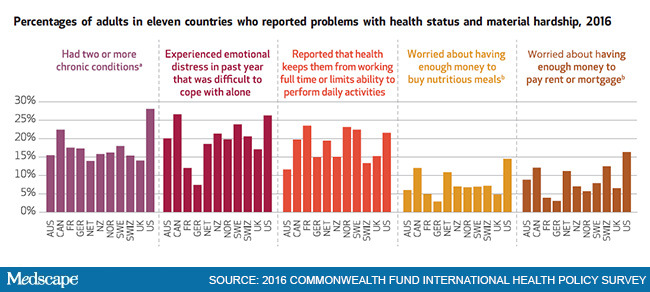Janis C. Kelly
November 21, 2016
The percentage of US adults reporting that they went without needed healthcare because of cost dropped from 37% in 2013 to 33% in 2016, according to data from a multinational telephone survey published online November 16 in Health Affairs. However, the rate remains double that in most other developed countries.
"Overall, the Netherlands performed at the top of the eleven-country range on most measures of access, engagement, and coordination," conclude Robin Osborn, MBA, vice president and director of the International Program in Health Policy and Practice Innovations at the Commonwealth Fund in New York, and colleagues. They note that all the countries surveyed except the United States have some form of national health system.
Osborn and colleagues surveyed nationally representative samples of noninstitutionalized adults in Australia, Canada, France, Germany, the Netherlands, New Zealand, Norway, Sweden, Switzerland, the United Kingdom, and the United States. The researchers used a standardized questionnaire for 17- to 25-minute telephone interviews. Sample sizes ranged from 1000 (Germany, the United Kingdom) to 7124 (Sweden), including 2001 adults in the United States. During analysis, the data were weighted "to ensure that the final outcome was representative of the adult population in each country."

The key survey question asked whether the respondent had gone without recommended care, not seen a physician when sick, or failed to fill a prescription because of costs. These problems were reported by 33% in the United States, 22% in Switzerland, 18% in New Zealand, 17% in France, 16% in Canada, 14% in Australia, 8% in Sweden and in The Netherlands, and 7% in Germany and in the United Kingdom.
The authors write, "[T]the health care systems in Canada, the Netherlands, and the United Kingdom have no deductibles or cost sharing for primary care; the French system exempts lowincome adults and those with chronic illnesses from cost sharing; and out-of-pocket spending is capped at 1 percent of income for the chronically ill in Germany and at US$123 annually in Sweden," and "adults in Canada (which does not universally cover prescription drugs) and Switzerland (which often has high copayments) have rates of financial barriers to care that are twice as high as those of their counterparts in Germany, the Netherlands, and the United Kingdom."
Delayed access to specialist care was a problem for 6% of US patients. The authors commented, "Adults in Canada, a country that stood out for the most serious access problems to primary care, also were the most likely to report having to wait two months or longer to see a specialist (30 percent), along with adults in Norway (28 percent). In contrast, fewer than 10 percent of adults reported waiting that long in France, Germany, the Netherlands, Switzerland, and the United States."
Access to dental care was a problem worldwide. Nearly one third (32%) of US patients reported skipping dental care because of cost, as did 28% in Canada, 23% in France, and 19% or more in Australia, France, New Zealand, Norway, Sweden, and Switzerland.
US adults, on average, reported poorer health than adults in other countries: 28% had at least 2 chronic conditions such as arthritis, asthma, diabetes, heart disease, or hypertension, vs 14% to 22% of adults in other countries.
Perhaps as a consequence, 59% of US adults reported having discussed healthy diet, exercise, and physical activity with a physician or other clinical staff. Such discussions were relatively rare in other countries and especially unlikely to have occurred in France or Germany (17%) or Norway (20%). The authors comment that missed opportunities for health promotion are "[a]mong the most striking findings of the survey." They write, "The vast majority of adults in all countries, except the United States, are not being engaged in conversations about how to lead a healthy lifestyle through good nutrition and exercise.... In this context, preventive counseling on diet and exercise may be indicated more frequently."
Another missed opportunity involved support to help patients manage their health problems. Fourteen percent of chronically ill US adults said they did not get the support they needed from healthcare providers to manage their conditions. This was twice the rate seen in Australia, Germany, the Netherlands, New Zealand, and Switzerland, but similar to rates in Canada, France, Norway, and Sweden.
The authors suggest that the survey findings "point to the need to take a population health orientation that identifies all of the contributors to poor health, including socioeconomic disadvantages that could affect health and well-being. Across countries — and across states in the United States — the evidence suggests that higher ratios of social to health spending are associated with better health outcomes."
The study was supported by the Commonwealth Fund. The authors are employees of the Commonwealth Fund.
Health Aff. Published online November 16, 2016. - Medscape Medical News © 2016 WebMD, LLC
Cite this article: Healthcare Access Issues Seen in US, Other Rich Countries. Medscape. Nov 21, 2016.

